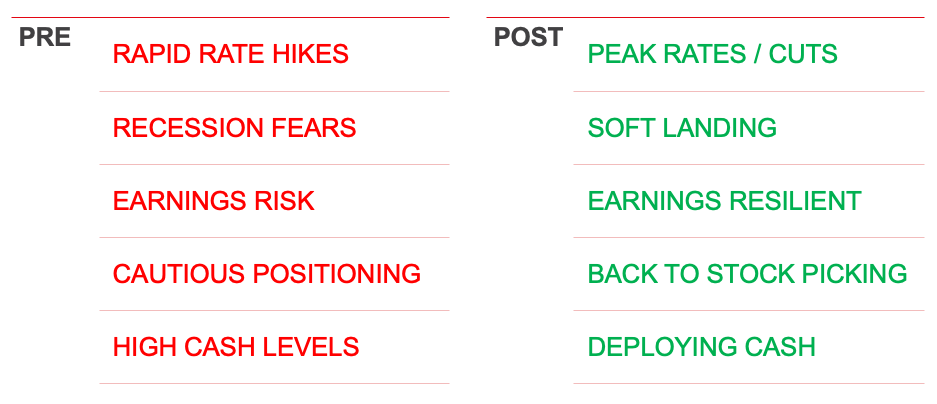Navigating future rate cuts and long-term investment strategies
In this week’s video insight, I discuss the Reserve Bank of Australia’s (RBA) recent decision to maintain current interest rate levels and anticipate the upcoming announcement from the U.S. Federal Reserve (Fed), where no changes are expected. Instead, the focus shifts onto potential indicators regarding future rate cuts. With recent market shifts and economic data influencing expectations, I delve into the broader implications for investors, highlighting the importance of maintaining a long-term perspective amidst short-term economic and financial fluctuations.
Transcript:
This week, all eyes are on the RBA and the Fed. And while nobody is expecting a move on interest rates, the focus is instead on whether either will make any pronouncements regarding the timing of a future rate cut.
I will discuss in a moment whether beguiling attention on the Fed and the RBA is spurious. For the moment however, let me cave to the pressure and provide an opinion.
Last week, all three major U.S. indices lost ground. The decline might have been in response to a reappraisal of the Fed’s rate-cutting blueprint. Today, most believe the Fed won’t be cutting rates as soon as once anticipated. With recent U.S. inflation data firmer and their job market still looking robust, the central bank is unlikely to signal any urgency with respect to rate cuts. Some economists and commentators believe the Fed may signal a reduced pace of rate cuts this year, from the hitherto-expected three rate cuts this year to just two or less.
In Australia, the RBA seems to be willing to tolerate a slightly higher level of inflation because it confers on the economy the benefit of salubrious employment conditions. The consequence, however, is that rates may take longer to be cut by the RBA than by overseas peers. Not a single economist – of which more than 40 were surveyed by Bloomberg – expects the RBA to move on rates this week.
But does any of this really matter to the long-term investor? Since first purchasing shares in Berkshire Hathaway in 1962 and then taking control of the then-beleaguered textile company in 1965, Warren Buffett has been investing successfully in companies listed on public markets. Meanwhile, the U.S. Federal Reserve’s Open Market Committee minutes and records of policy decisions go back to 1936.
Imagine Warren Buffett, and then subsequently with Charlie Munger, had fretted over every rate decision or Fed meeting since 1965? Charlie Munger recently passed away just weeks from his 100th birthday. I suspect he would have passed much earlier if he had worried about each Fed decision, the way investors pour over it today. More importantly, history reveals that those Fed decisions didn’t matter at all, in the long run, to the wealth accumulation enjoyed by those who invested in Berkshire.
Right now, you might be thinking about how the market is going to react to news the Fed pulls back from three possible rate cuts this year to just two cuts or even one. Sure, the market might react negatively, but therein lies the opportunity. Don’t listen to the market; take advantage of it. As Wall street’s Dean of value investing, Ben Graham, once noted, it’s not the market’s wisdom you should be interested in but its wallet.
As an investor this week, you should keep the bigger picture in mind. Take a look at this table prepared by Gary Rollo and Dominic Rose at The Montgomery Small Companies Fund…

We used to be in an environment of rapidly rising rates. Now, rates appear to have peaked. They may not drop quickly, but they’re even less likely to go up. Last year, investors were worried – undeservedly, I think – about a recession. Today, a soft landing is all but guaranteed. Meanwhile, those recession and rate hike concerns had many investors concerned about corporate earnings. Today, as the recent reporting season revealed, earnings are resilient and, in some cases, growing robustly. And finally, high cash levels are giving way to the deployment of that cash into judiciously-selected stocks, even small caps – which, as an aside, I think could seriously outperform over the next 18-24 months.
So, forget about central bank meetings, rate rises, and cuts and just focus on buying higher quality businesses that are growing, enjoy sectoral tailwinds, and have pricing power or other competitive advantages. You’ll do fine long term, irrespective of what the central banks do next.